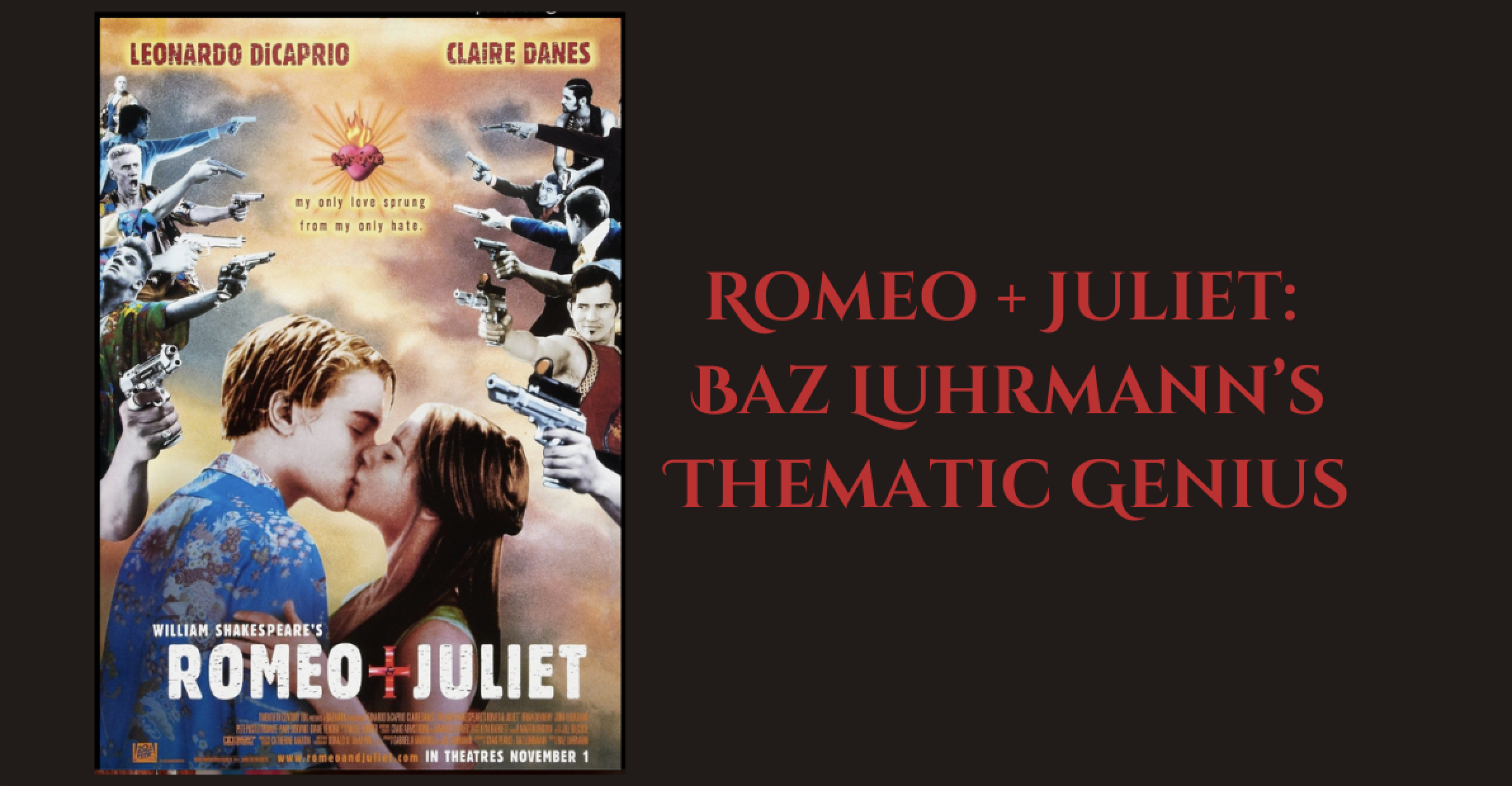Because everyone loves a good story
Romeo + Juliet: Baz Luhrmann’s Thematic Genius

The first time I watched Baz Luhrmann’s movie Romeo + Juliet, I was really taken off guard. Maybe you can relate.
Since I was a totally normal kid, I requested the massive tome of Arden’s Complete Works of Shakespeare for my birthday when I was in high school. Yea, verily, I posthaste read the sonnets, comedies, and a sprinkling of the tragedies, including Romeo and Juliet.
As much as I relished the early modern English and the antiquated wordplay, it did give off “olden day” vibes. It was hard to picture any of it happening anywhere but the Globe theater.
Taken by Surprise
When I saw the cover of Luhrmann’s film adaptation years later, I figured it would be a modernized spin on the old text. As soon as the characters started talking, though, I saw my mistake: it WAS the old text. The story is set in modern day Verona Beach—complete with Hawaiian shirts and hand guns—but the script is the original Shakespeare.
I was shocked, but I was not appalled. After I recovered from the initial jarring sensation of watching the Montague and Capulet boys have a shootout at a downtown gas station while hearing the words, “Have at thee, coward,” I thoroughly enjoyed it. This is when I discovered that Baz Luhrmann is one of my favorite directors.
Comedy or Tragedy

Despite the fabulous filming of the movie, the story of Romeo and Juliet really is a bummer. I mean, loads of people die in a senseless feud. The young lovers kill themselves hastily just moments before learning that things aren’t as bad as they seem. The families finally make peace, but it’s in the midst of a wreckage that their stubbornness has caused. This, my friends, is a tragedy.
Of course it’s a tragedy that everyone dies, but it’s also a Tragedy—the literary form that ends with death rather than joy. In Shakespeare’s comedies, for example, the plays usually end with a wedding to show joy, celebration, and reconciliation. His tragedies, however, end with death. The tragic storyline shows futility, confusion, and hopelessness. It’s a wonder they’re so popular.
A Winning Structure
And they’re certainly popular. There are a plethora of modern books and movies that follow the tragic storyline, although I’m not familiar with many of them. But a quick examination of some of my own favorites revealed how many of them are in the tragic form: Romeo and Juliet, The Great Gatsby, The Yearling, Anna Karenina, Moulin Rouge!, The Fountain, Frankenstein, Lord of the Flies, 1984…the list could go on.
What is it about this form that resonates so deeply with us? I think it’s the familiar pattern of tension, triumph, and tragedy. It’s so basic to the human experience that, even though we don’t like it, we know it’s true.
A Day in the Life

Think of how often you go through the cycle of tension, triumph, and tragedy. You have an unmet desire—for love, success, validation, or even just a slice of cake—and you start working toward it. There’s tension as you strive, wondering whether you’ll achieve the goal you desire. Finally, your hard work pays off! You triumph. Your love is requited, your success is acknowledged, your point of view is validated, and you find a slice of cake in the break room. In a comedy, this would be the end of the story. You’d marry your love and share the cake.
But this is a tragedy, so you lose it all. Somehow, factors beyond your control rob you of the prize for which you worked. Just before you take your first bite, the cake slips off the plate and lands on the floor. You’re left with nothing but brokenness and the reminder of what could have been. We may only experience this on a catastrophic scale a few times in our lives, but we go through it in small ways all the time. It’s just life in this broken world.
Why Bother?
Talk about a Debbie downer. Is there any value in studying stories like this? Absolutely. On the most basic level, they work as cautionary tales: beware of putting all your hope in love, success, validation, or cake. But even more importantly, the failure of these things to satisfy us is a reminder that they weren’t meant to satisfy us in the first place. We were made for more that love and cake, and nothing reminds us of that more than losing them.
Although there’s nothing wrong with pursuing cake. In my experience, it’s still a worthy goal.
The Challenge
So if you’re already a fan of Shakespeare, Baz Luhrmann, Romeo and Juliet, or the young Leonardo DiCaprio, I think the next two posts will interest you greatly. If you’re not already a fan, let me challenge you: rent the movie. Watch the movie. Think about the movie. Then come back next time ready to analyze the movie.
Because, like any well-made film, there are symbolic layers at work that give it a richer depth of meaning, and I’m so excited to look at two of those with you: the motifs of religious icons and water. Until next time, friends, I hope your life is a comedy so you can enjoy that cake. I fully intend to.

Add a comment, and join the conversation!